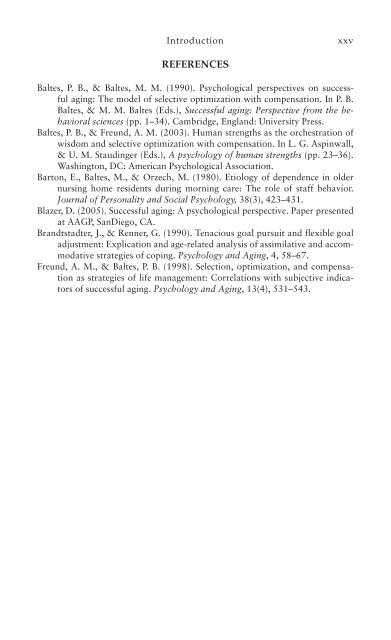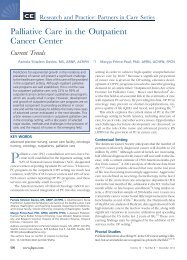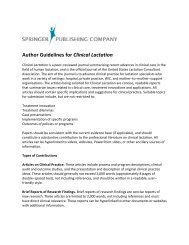Geropsychological interventions in long-term care - Springer ...
Geropsychological interventions in long-term care - Springer ...
Geropsychological interventions in long-term care - Springer ...
You also want an ePaper? Increase the reach of your titles
YUMPU automatically turns print PDFs into web optimized ePapers that Google loves.
Preface<br />
You cannot depend on your eyes when your imag<strong>in</strong>ation is out of<br />
focus.<br />
Mark Twa<strong>in</strong><br />
We are <strong>in</strong> a remarkable time; 40 years ago, the only anxiety disorders<br />
that were considered untreatable were obsessive-compulsive disorder and<br />
panic disorder. Th<strong>in</strong>gs have changed and we had to endure that time, that<br />
science, and that conclusion to reach this po<strong>in</strong>t. We offer a book that is<br />
also captured somewhere <strong>in</strong> time, one that will certa<strong>in</strong>ly change more<br />
rapidly than this example, because studies <strong>in</strong> <strong>long</strong>-<strong>term</strong> <strong>care</strong> (LTC) are<br />
now more <strong>in</strong>formative and more evident.<br />
Across the past decade, the typical LTC resident has become frailer,<br />
as well as more physically, cognitively, and psychologically vulnerable.<br />
Many believe this phenomenon is largely due to a change <strong>in</strong> the system.<br />
Specifically, they highlight the emergence of the Prospective Payment<br />
System (PPS) for Medi<strong>care</strong> hospital expenses. At the time of its <strong>in</strong>ception<br />
<strong>in</strong> 1984, the goal of PPS was to reduce health <strong>care</strong> costs. Exam<strong>in</strong><strong>in</strong>g its<br />
success <strong>in</strong> achiev<strong>in</strong>g this goal, Estes et al. (1993) analyzed the impact of<br />
PPS on community-based LTC systems. Their results suggest that PPS<br />
leads older adults to return to the community from acute-<strong>care</strong> sett<strong>in</strong>gs<br />
or to posthospital rehabilitation <strong>in</strong> LTC facilities “quicker and sicker”<br />
than ever before (Estes et al., 1993). Fischer and Eustis (1989) argue<br />
that not only does PPS <strong>in</strong>fluence the marg<strong>in</strong>s of hospital <strong>care</strong> but it also<br />
<strong>in</strong>fluences the <strong>in</strong>teractions between acute and LTC facilities. More importantly,<br />
Fischer and Eustis (1989) state that PPS has altered the nature<br />
of family <strong>care</strong>. Families are expected to provide <strong>care</strong> services for <strong>in</strong>creas<strong>in</strong>gly<br />
<strong>long</strong>er periods, often until the family system can no <strong>long</strong>er susta<strong>in</strong><br />
the <strong>care</strong>giv<strong>in</strong>g burden.<br />
The impact of this social policy has been gradual and harmful, especially<br />
<strong>in</strong> relation to the LTC resident’s ability to ma<strong>in</strong>ta<strong>in</strong> autonomy and<br />
dignity with<strong>in</strong> the LTC system. The typical resident suffers from a dizzy<strong>in</strong>g<br />
array of complicated medical, cognitive, and psychological issues<br />
that are agoniz<strong>in</strong>gly slow to unravel. For the practice of mental health <strong>in</strong><br />
xv

















